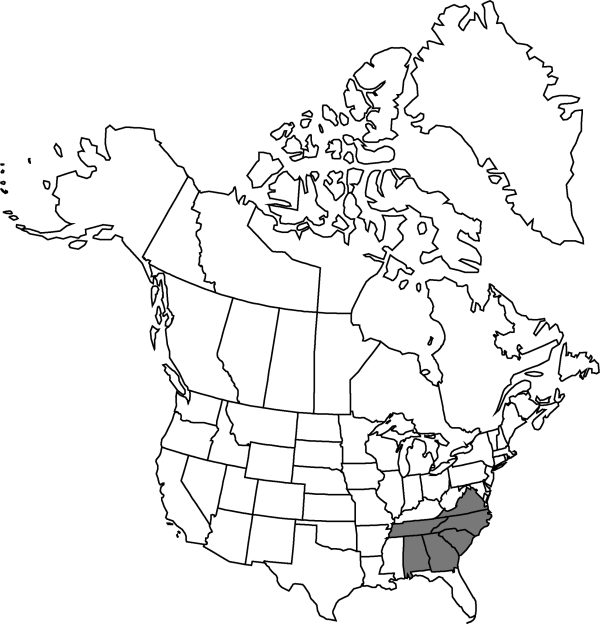Difference between revisions of "Phemeranthus mengesii"
Novon 11: 320. 2001.
Endemic
Basionym: Talinum mengesii W. Wolf Amer. Midl. Naturalist 6: 153. 1920
FNA>Volume Importer |
imported>Volume Importer |
||
| (7 intermediate revisions by 2 users not shown) | |||
| Line 7: | Line 7: | ||
|year=2001 | |year=2001 | ||
}} | }} | ||
| − | |basionyms={{Treatment/ID/ | + | |special_status={{Treatment/ID/Special_status |
| + | |code=E | ||
| + | |label=Endemic | ||
| + | }} | ||
| + | |basionyms={{Treatment/ID/Basionym | ||
|name=Talinum mengesii | |name=Talinum mengesii | ||
|authority=W. Wolf | |authority=W. Wolf | ||
| + | |rank=species | ||
| + | |publication_title=Amer. Midl. Naturalist | ||
| + | |publication_place=6: 153. 1920 | ||
}} | }} | ||
|synonyms= | |synonyms= | ||
| Line 19: | Line 26: | ||
}}<!-- | }}<!-- | ||
| − | --><span class="statement" id="st- | + | --><span class="statement" id="st-undefined" data-properties=""><b>Plants </b>to 4 dm; roots elongate, fleshily woody. <b>Stems</b> ± erect, usually branching. <b>Leaves</b> sessile; blade terete, to 7 cm. <b>Inflorescences</b> cymose, much overtopping leaves; peduncle scapelike, to 20 cm. <b>Flowers</b>: sepals deciduous, ovate, 3–4 mm; petals pink to rose-purple, obovate, 9–15 mm; stamens (40–)50–100; stigma 1, subcapitate. <b>Capsules</b> subglobose, sometimes trigonous, 3–4 mm. <b>Seeds</b> without arcuate ridges, 0.8–1 mm. <b>2n</b> = 24, 48.</span><!-- |
-->{{Treatment/Body | -->{{Treatment/Body | ||
| + | |phenology=Flowering Apr–Oct. | ||
|habitat=Woods, glades, barrens, cliffs, outcrops, rocky banks, sandstone, granite, gneiss, rarely limestone | |habitat=Woods, glades, barrens, cliffs, outcrops, rocky banks, sandstone, granite, gneiss, rarely limestone | ||
|elevation=100-1000 m | |elevation=100-1000 m | ||
|distribution=Ala.;Ga.;N.C.;S.C.;Tenn.;Va. | |distribution=Ala.;Ga.;N.C.;S.C.;Tenn.;Va. | ||
| − | |discussion=<p>Most populations of Phemeranthus mengesii are diploid but a few scattered in western Georgia are tetraploid, probably the result of autopolyploidy (W. H. Murdy and M. E. B. Carter 2001).</p> | + | |discussion=<p>Most populations of <i>Phemeranthus mengesii</i> are diploid but a few scattered in western Georgia are tetraploid, probably the result of autopolyploidy (W. H. Murdy and M. E. B. Carter 2001).</p> |
|tables= | |tables= | ||
|references={{Treatment/Reference | |references={{Treatment/Reference | ||
| Line 40: | Line 48: | ||
-->{{#Taxon: | -->{{#Taxon: | ||
name=Phemeranthus mengesii | name=Phemeranthus mengesii | ||
| − | |||
|authority=(W. Wolf) Kiger | |authority=(W. Wolf) Kiger | ||
|rank=species | |rank=species | ||
| Line 47: | Line 54: | ||
|basionyms=Talinum mengesii | |basionyms=Talinum mengesii | ||
|family=Portulacaceae | |family=Portulacaceae | ||
| + | |phenology=Flowering Apr–Oct. | ||
|habitat=Woods, glades, barrens, cliffs, outcrops, rocky banks, sandstone, granite, gneiss, rarely limestone | |habitat=Woods, glades, barrens, cliffs, outcrops, rocky banks, sandstone, granite, gneiss, rarely limestone | ||
|elevation=100-1000 m | |elevation=100-1000 m | ||
| Line 53: | Line 61: | ||
|publication title=Novon | |publication title=Novon | ||
|publication year=2001 | |publication year=2001 | ||
| − | |special status= | + | |special status=Endemic |
| − | |source xml=https:// | + | |source xml=https://bitbucket.org/aafc-mbb/fna-data-curation/src/2e0870ddd59836b60bcf96646a41e87ea5a5943a/coarse_grained_fna_xml/V4/V4_1002.xml |
|genus=Phemeranthus | |genus=Phemeranthus | ||
|species=Phemeranthus mengesii | |species=Phemeranthus mengesii | ||
| − | |||
| − | |||
| − | |||
| − | |||
| − | |||
| − | |||
| − | |||
| − | |||
| − | |||
| − | |||
| − | |||
| − | |||
| − | |||
| − | |||
| − | |||
| − | |||
| − | |||
| − | |||
| − | |||
| − | |||
| − | |||
| − | |||
| − | |||
| − | |||
| − | |||
| − | |||
}}<!-- | }}<!-- | ||
-->[[Category:Treatment]][[Category:Phemeranthus]] | -->[[Category:Treatment]][[Category:Phemeranthus]] | ||
Latest revision as of 21:56, 5 November 2020
Plants to 4 dm; roots elongate, fleshily woody. Stems ± erect, usually branching. Leaves sessile; blade terete, to 7 cm. Inflorescences cymose, much overtopping leaves; peduncle scapelike, to 20 cm. Flowers: sepals deciduous, ovate, 3–4 mm; petals pink to rose-purple, obovate, 9–15 mm; stamens (40–)50–100; stigma 1, subcapitate. Capsules subglobose, sometimes trigonous, 3–4 mm. Seeds without arcuate ridges, 0.8–1 mm. 2n = 24, 48.
Phenology: Flowering Apr–Oct.
Habitat: Woods, glades, barrens, cliffs, outcrops, rocky banks, sandstone, granite, gneiss, rarely limestone
Elevation: 100-1000 m
Distribution

Ala., Ga., N.C., S.C., Tenn., Va.
Discussion
Most populations of Phemeranthus mengesii are diploid but a few scattered in western Georgia are tetraploid, probably the result of autopolyploidy (W. H. Murdy and M. E. B. Carter 2001).
Selected References
Lower Taxa
None.